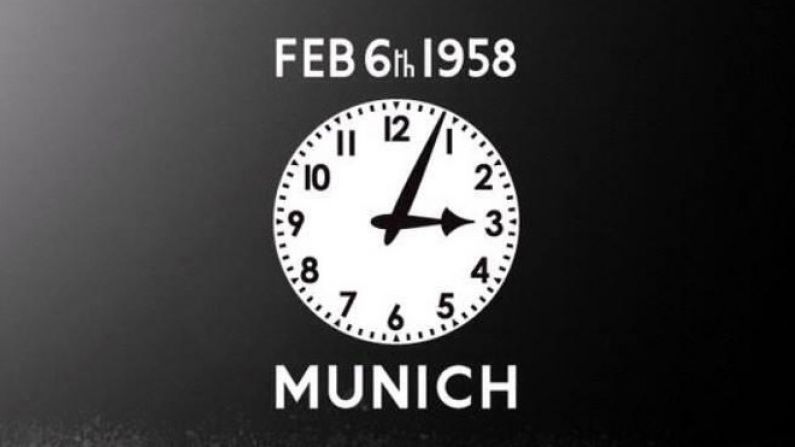To mark the anniversary of the Munich Air Disaster, Rob O'Hanrahan discusses the crash investigation and the subsequent effect it had on Anglo-German relations. You can follow Rob on Twitter here.
-----------------------------------------------------------------------------------------------------------------------------------------------------------------------------------------------------------
On the sixth of February 1958, British European Airways Flight 609, an Elizabethan Aircraft, crashed upon its third take-off attempt from Munich-Riem Airport in Munich, Germany, where the plane had stopped for refuelling. The previous two attempts of take off were abandoned when boost surging occurred in the plane’s engines. Captains James Thain and Kenneth Rayment decided to attempt take off again. As the plane hurtled down the runway, gathering speed, the passengers relaxed in anticipation of a safe journey home. However, halfway down the runway the plane began to inexplicably lose speed. As both captains struggled to gain control, the plane careered off the runway, hurtled through the boundary fence, and continued for a further 100 yards before crashing into a house.
On board the flight were 44 people, comprising of the Manchester United football team, the club officials, journalists and a few other people. As Thain struggled from the wrecked cockpit, he saw flames licking over the plane. Fearing an explosion, he ordered all survivors to immediately leave the area. However, goalkeeper Harry Gregg insisted on returning into the plane, where he rescued the pregnant Vera Lukic and her baby daughter Venona. 21 of the 44 people on board the aircraft died instantly, and two more died from their injuries in the following weeks. Among the dead were co-captain Rayment, along with 8 of the “Busby Babes”, club officials and 8 of the 9 travelling journalists.
It later took four inquiries across England and Germany to clear Captain Thain of the blame for the tragedy. Due to German intransigence, and officials’ refusal to accept any ulterior cause, the first three inquiries concluded that Thain’s negligence of his plane’s wings resulted in a build-up of ice, which inhibited take off. However, after 11 years of legal battles and painstaking research, the Fay Commission concluded in 1969 that due to slush that had built up on the runway, the aircraft was unable to reach the velocity needed to take off.
All survivors, and the fatally wounded, were treated in the Rechts der Isar Hospital in Munich. There, under the care of a dedicated nursing staff led by Professor Georg Maurer, many of the injured survived. Ironically, many of these Englishmen now owed their lives to the surgeon Maurer, who had been awarded the Iron Cross for his bravery while tending German forces on the beaches of Dunkirk in the Second World War.
The face of Manchester United changed irrevocably after the incident. Manager Sir Matt Busby remained in hospital for 2 months, and returned to find a struggling team with a crippled backroom staff. Busby had created a close atmosphere in the club, and had reared the current players from the tender age of 13. He wasn’t told of the death toll until a month and a half after the crash, for fear his condition would deteriorate further. One of the surviving players, Bobby Charlton, later stated that “He (Busby) felt responsible. Those were his kids that died that day”. Until his death in 1994, Sir Matt Busby attended every home game that United played. It was then, as he watched the football unfold, that he was haunted by the Munich Air Disaster. He would say; “I still see them play, you know”. Irony again prevailed in Matt Busby’s story. He had been given the last rites three times, and was given little to no chance of survival at any stage. However, again under Professor Maurer, and against all odds, he survived. Busby later recalled how an image of his late father had kept him strong, his father who had been killed by a German sniper during the Battle of the Somme. It is this, amongst many other startling congruencies, which sparked a huge improvement in Anglo-German relations following World War II.
It is strange to say, but huge positives were to be taken from the wreckage of a snowy Munich runway, as opinions and prejudices of German people formed in the aftermath of World War II began to change. The English people, who had been just resurfacing after WW1, found themselves dragged into another bitter and costly war against the Germans. The belief of many English people was that the German people were a hostile race, who mirrored their fascist dictator in every way. In particular, families who had lost loved ones or been separated during the Battle of Britain felt particularly aggrieved. After the Munich Air Crash, however, public opinion began to shift.
It is important not to underestimate the importance of football in cities such as Manchester in the 20th Century. It was opium for the working class masses, and the team was comprised of young, local men, unrecognisably accessible compared to the modern celebrity demi-gods we see today. In truth, Manchester United was more of a family than a football team, and when this family was ripped apart in Munich, the public outpouring of grief lasted for weeks. The funerals of the victims were remarkable tributes to the young men who had perished. When the bodies of the footballers were transported to England, the coffins were brought in procession from the airport to Old Trafford. It was estimated that 200,000 people lined the streets on a cold, wet February night to pay their respects. As the dust settled from the crash, a remarkable change was wrought across England.
David Hall, author of “Manchester’s Finest”, lived in Manchester at the time of the crash. He was a young boy, who had seen his footballing heroes torn asunder on foreign soil. Yet, he remarks how the ‘foreign, evil aliens’ that he had come to know the Germans as, were transformed in his eyes to the kind and caring doctors and nurses of the Rechts der Isar hospital in Munich. He also states how he had grown up in a working-class area, where a lot of war veterans had returned to just over a decade ago, including his own father. He found it astonishing to see the reactions of these veterans when Professor Maurer and a team of German diplomats visited the city of Manchester a few months after the crash. “Less than fifteen years after trying to kill their countrymen, we stood and applauded these people as our heroes”.
This shift in opinions did not only take place amongst the working-class people. In Frank Taylor’s book, “The Day a Team Died”, he remarks on two things he will never forget: “I can never forget that, out of this great human tragedy, there was forged a great bond of friendship between the cities of Manchester and Munich. And, I can never forget the wise words of the British Consul in Munich, Mr J. Somers-Cocks, who told me: “I believe this terrible accident has done more for Anglo-German relations than any other single incident in my career with the Consular Service”. This remarkable quote epitomises the effect that the Munich Air Disaster had on Anglo-German relations. John Sebastian Somers-Cocks was the British Consul in Munich from 1954-1959, and would have been faced with the huge task of repairing the ruin that was relations between Germany and England following WWII. For such an experienced and well-respected member of the British Consular Service to state this shows the dramatic change of people’s opinions following the tragedy.
It is said that football is the international language, the beautiful game. Legendary manager Bill Shankly once stated that “Some people think football is a matter of life and death. I assure you, it's much more serious than that.” It is clear to see that it also broke down iron-clad barriers which had been erected following WWII. In the years following the crash, the phoenix became the associated symbol of Manchester United. Rising from the ashes of destruction, a new era was formed. However something else clearly rose from the smouldering ashes of British European Airways Flight 609 on German soil: a new beginning of peaceful co-existence between Germany and England. Such a tragic loss of human life sparked a revival of Anglo-German relations, and over half a century later, they remain unforgotten. I close with an excerpt from one fan’s tribute, the ballad ‘The Flowers of Manchester’.
Oh, England's finest football teams its record truly great,
its proud successes mocked by a cruel turn of fate.
Seven men will never play again, who met destruction there,
the flowers of English football, the flowers of Manchester.















